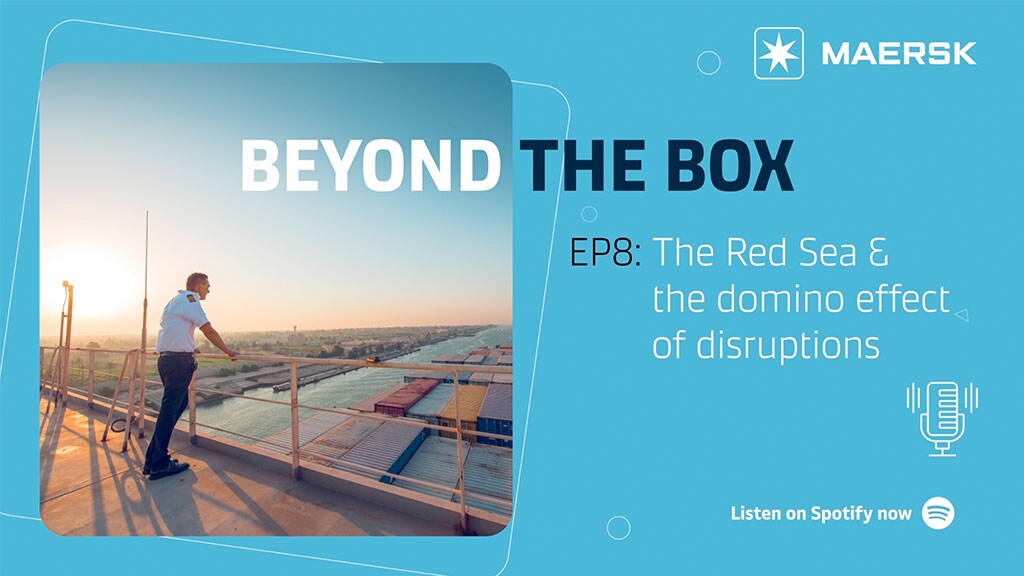The Red Sea region has long been an important artery for global trade. In 2023, the Suez Canal handed 12% to 15% of global trade, according to the United Nations Conference on Trade and Development (UNCTAD). Since Houthi attacks on vessels in the Gulf of Aden / Red Sea began in December, UNCTAD estimates that trade volumes have decreased by 42%.
Since 18 December, several countries, including the United States and United Kingdom, have come together to form a military protection alliance called Operation Prosperity Guardian. Nonetheless, the attacks have continued and continued to put the safety of seafarers at risk. Given this, all major carriers have ceased to send ships through the area and instead diverted them south around Africa via the Cape of Good Hope.
The domino effect of disruptions
Peter Sand, Chief Analyst with the ocean analytics company Xeneta, spoke to the Beyond the Box podcast about how the situation in the Red Sea has affected supply chains. “We are seeing some assembly lines close down due to the longer transit times and the lack of cargo . . . It has knock-on effects for global shippers as well as carriers and freight forwarders,” he said.
“Something like this is a watershed moment for the general public and citizens of the world, because they have been accustomed to globalisation. They have been getting goods from everywhere at any given time. So one lesson for sure is the importance of safeguarding global and maritime supply chains is paramount.”
Other watershed moments that has caused widespread disruption in recent years, have included the COVID-19 pandemic, the Suez Canal blockage, and the Panama Canal drought. While these crises are different in many ways, the outcome can follow a pattern.
According to: “What we normally see if a pattern and an anatomy in all these recent crises, to varying degrees. What we normally see is a trigger event and that disrupts the flow of goods,” Omera Khan, Head of Supply Chains Insights and Trends Practice, at Maersk, told the podcast. “ It creates disruptions across an entire supply network. That can create capacity strain. It can create bottlenecks. And that leads to problems like shipping capacity. That then in turn leads to delays, increased costs, which have a ripple effect across all parts of the economy. That leads to increased prices for goods and for services, creates inflationary pressure. It reduces economic growth.”
Building more resilient supply chains
As Peter Sand explained, the heavy reliance on globalisation and just-in-time supply chains has exacerbated many of these structural problems. When businesses keep minimal inventories and rely on timely deliveries, they are more vulnerable to disruptions.
There are supply chain resilience strategies that companies can put in place to better protect themselves against the supply chain disruptions expected in 2024 and beyond. These include boosting visibility, diversification, improving agility and flexibility, and strengthening collaboration.
Safeguarding global and maritime supply chains is paramount for the world's interconnected future. At the same time, it is widely accepted that supply chain disruptions will continue to be present in global trade, and that businesses should increase their resilience of their supply chains so they can ride out the storms.
Don’t miss the latest episodes of the Beyond the Box podcast. Subscribe on Spotify, Apple Podcasts, or wherever you listen.
Sign up to The Logistics Pulse newsletter
You did it, welcome onboard!
We're sorry, but there was a problem sending your contact request.
Please review the form fields and ensure all required information is provided correctly. If the issue persists, please contact our support team for further assistance.
Sign up to The Logistics Pulse newsletter
Receive our insights directly in your mailbox by signing up through this form and enter a world of truly integrated logistics. Get inspired by our selection of articles that help you navigate supply chains, understand industry trends, and shape your logistics strategy. You can unsubscribe anytime.
I agree to receive logistics related news and marketing updates by email, phone, messaging services (e.g. WhatsApp) and other digital platforms, including but not limited to social media (e.g., LinkedIn) from A. P. Moller-Maersk and its affiliated companies (see latest company overview). I understand that I can opt out of such Maersk communications at any time by clicking the unsubscribe link. To see how we use your personal data, please read our Privacy Notification.
By completing this form, you confirm that you agree to the use of your personal data by Maersk as described in our Privacy Notification.


